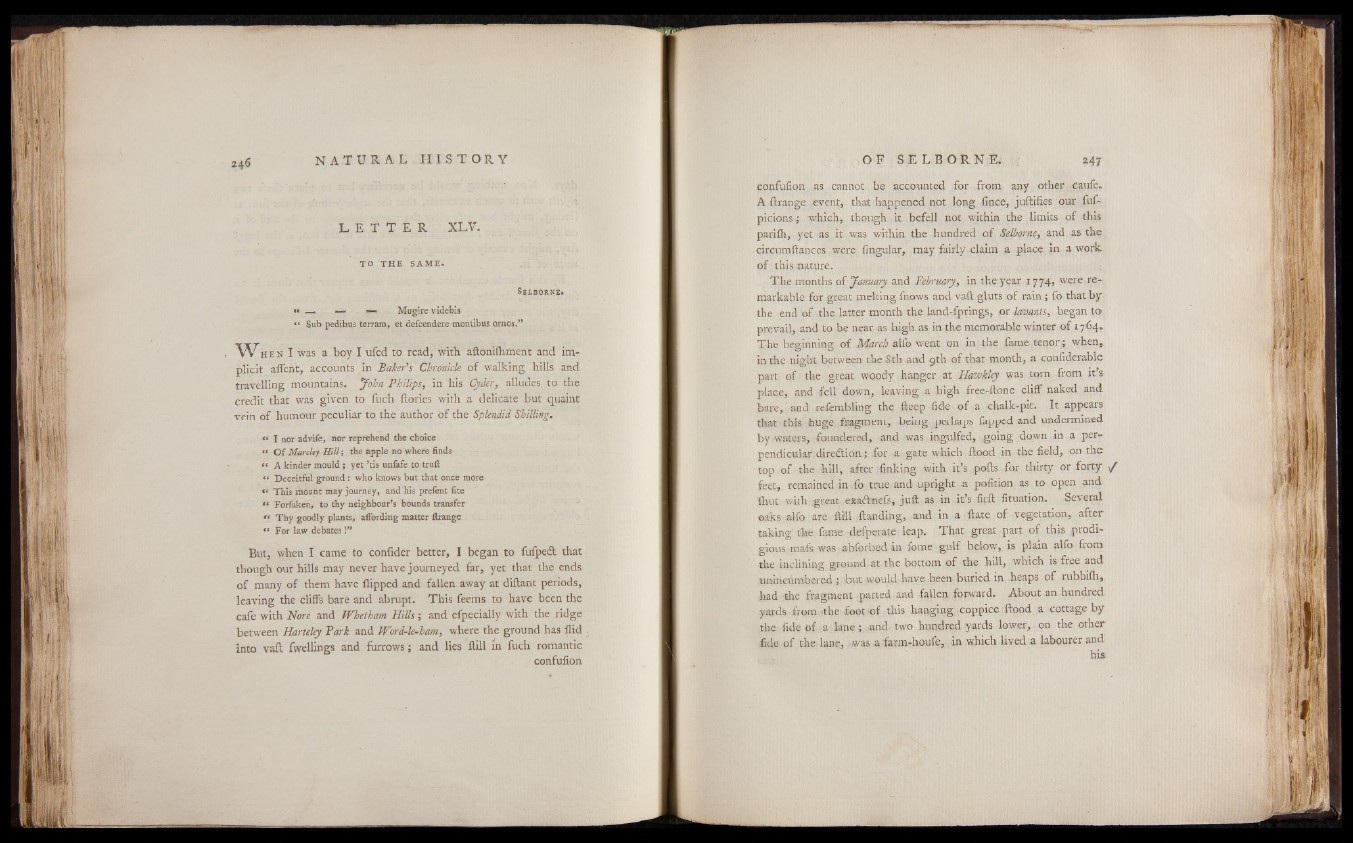
L E T T E R XLV.
TO THE SAME.
Selborns*
« —. — — Mugire videbis
<( Sub pedibus terram, et defcendere montibus ornos.”
W " hen I was a boy I ufed to read, with aftonifhment and implicit
affent, accounts in Baker’s Chronicle of walking hills and
travelling mountains. John Philips, in his Cyder, alludes to the
credit that was given to fuch ftories with a delicate but quaint
vein of humour peculiar to the author of the Splendid Shilling.
« I nor advife, nor reprehend the choice
« O f Marcley H ill; the apple no where finds
,e A kinder mould; yet ’tis unfafe to truft
« Deceitful ground: who knows but that once more
« This mount may journey, and his prefent fite
Forfaken, to thy neighbour’s bounds transfer
€t Thy goodly plants, affording matter ftrange
“ For law debates !”
But, when I came to confider better, I began to fufpedl that
though our hills may never have journeyed far, yet that the ends
of many of them have flipped and fallen away at diftant periods,
leaving the cliffs bare and abrupt. This feems to have been the
cafe with Nore and Whetham H ills; and efpecially with the ridge
between Harteley Park and Word-le-ham, where the ground has Aid
into vaft: fwellings and furrows; and lies ftill in fuch romantic
confufion
confufion as cannot be accounted for from any other caufe.
A Arrange event, that happened not long fince, j uftifi.es our fuf-
picions; which, though it befell not-within the limits of this
parifh, yet -as it was within the hundred of Selbqrne, and as the
circumftances were lingular, may fairly.claim a place in a work
of this nature.
The months of January send. February, in the year 1774» were remarkable
for great melting fnows and vaft gluts of rain; fo that by
the end of the latter month the land-fprings, or lavants, began to
prevail, and to be near as high as in the memorable winter of 1764.
The beginning of March alfo went on in the fame tenor; when,
in the night between the 8th and 9th of that month, a confiderable
part of the great woody hanger at Hawkley was torn from it’s
place, and fell down, leaving a high free-ftone cliff naked and
bare, and refembling the fteep fide o f a chalk-pit. It appears
that this huge fragment, being perhaps flapped and undermined
by waters, foundered, and was ingulfed, going down in a perpendicular
diredlion; for a gate which flood in the field, on the
top of the hill, after finking with it’s polls for thirty or forty /
feet, remained in fo true and upright a pofition as to open and
lhut with.great enadtnefs, juft as in it’s firft fituation. Several
oaks alfo are ftill Handing, and in a ftate of vegetation, after
taking' the fame defperate leap. That great part of this prodigious
-mafs was abforbed in fome gulf below, is plain alfo from
the inclining ground at the bottom of the hill, which is free and
unincumbered; but would have-been buried in heaps of rubbifh,
had the fragment parted and fallen forward. About an hundred
yards from the foot of this hanging coppice flood a cottage by
the fide of a lane; and two hundred yards lower, on the other
fide of the lane,, was a farm-houfe, in which lived a labourer and
his